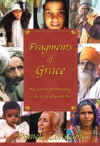|
|
the-south-asian.com August 2004 |
||||
|
August
2004 Culture & History
Pitamber
Singh
River-linking
project Lifestyle Orange
cauliflower Lehngas - a limited collection Books Between
Heaven and Hell
|
|
||||
|
Pamela Constable & by Surabhi Khosla
Author Pamela Constable’s intensely personal memoir of South Asia Fragments of Grace—My Search For Humanity From Kashmir To Kabul is an account of the author’s time as Washington Post’s bureau chief criss-crossing India, Pakistan, Sri Lanka, Afghanistan and Nepal.. In a land rife with political and religious turmoil there has emerged a literary piece which seeks signs of humanity and dignity and searches for a sliver of hope in some of the most poverty-stricken, violence-ridden lands of South Asia. Fragments of Grace by Pamela Constable is an intensely written book - part autobiography, part political history and part travelogue. Currently based in Kabul, Pamela has been covering South Asia for the Washington Post since April 1999, spending the last four years as the region’s bureau chief. The co-author of A Nation of Enemies: Chile Under Pinochet, she was awarded Alicia Patterson Fellowship and the Maria Moors Cabot Prize.
For the last four and a half years, Pamela has been on assignment following up on political crises, religious controversies and natural calamities for the newspaper. While filing some of the more dangerous datelines in the world – Musharraf’s coup in Pakistan, the royal massacre in Nepal, terrorism in Kashmir and Sri Lanka, Taliban rule in Afghanistan – she would often stop to think beyond the headlines. Trying to gain an introspective insight into this contemporary commotion and its effect on her own life as well as the lives of millions is probably what drove Pamela to confine to paper, her views on South Asia in the twenty first century in the form of her new book, Fragments of Grace. The use of the conventional style of travel writing (the book covers her escapades from Kashmir to Kabul from Nepal to Sri Lanka and from Pakistan to India) not only helps capture the exotic aura of the places that she is writing about but also helps her make analogies about things that she has been witness to. However, Pamela’s perceptions about South Asia - like most American analysts is- very American. To her Kashmir, feels like the Gaza Strip and "the teenaged Muslim suicide bomber and the Tamil Tiger Cub human bomb look like almost the same boy." It is in the midst of this mayhem that Pamela with her narrative tries (and not always in vain) to look for an indication of a sympathetic human spirit. Shards of Hope However the fragments that she refers to in the title may not always imply the shards of hope she hopes to find in South Asia but could easily apply to her own ravaged life. The deep reflections of her fatefully short-lived relationships, her failed marriages and sometimes frustrating solitude appear at the end of each chapter. In an extended bout of soul searching Pamela talks about her lust for writing, her penchant of all things dangerous, the inevitable adrenaline rush at the start of a fresh assignment because of which she had to spurn all other choices. The reflective private musings are moving and add a personal touch to the book. Other parts of the book that work really well are where she gets emotionally involved with her work. Her writings on Afghanistan both during the Taliban rule and in the aftermath are a reader’s delight particularly her outrage at the plight of women and the conservative attitude towards them fuelled mainly by her Western thoughts and ideals. Pamela admits that ‘getting to interview women in Afghanistan was immensely exasperating because no one would come forward.’ But whenever she managed one interview she would successfully turn it into an enlivening piece of writing. However in jumping from one crisis ridden land to another Pamela somehow loses the focal thrust of her book and many parts of her writing leave the reader visibly thirsting for more substantial information. The chapters on India and Sri Lanka have been written in an almost offhand and casual manner to say the least while the section on Nepal adds nothing new to what one already knows about King Birendra’s assassination. Her repeated visits to the Kashmir Valley where Pakistan-backed terrorists are waging an intensive war could have been more in-depth and incisive than they are. Also some of the local customs, which she tries to describe, fail to arouse emotions. One wonders why Pamela did not confine her book to her exploits in and her knowledge of Taliban and post Taliban Afghanistan, which would have made for a more intellectual and dynamic writing. The answer is simple and lies in her thoughtful reverence of not just her own life but also the lives of many others who she met along the way. To quote a line from the book, "When I finally found something redeeming, it was such a slender, ephemeral fragment of grace that I almost missed it in all the mayhem." Pamela’s book is a poignant portrait of a rich but solitary life of a foreign correspondent. She not just turns her searing gaze on herself but on others as well. It is this slender binding thread that makes the book well worth reading. - *****
|
|||||
| Copyright © 2000 - 2004 [the-south-asian.com]. Intellectual Property. All rights reserved. | |||||
| Home | |||||

